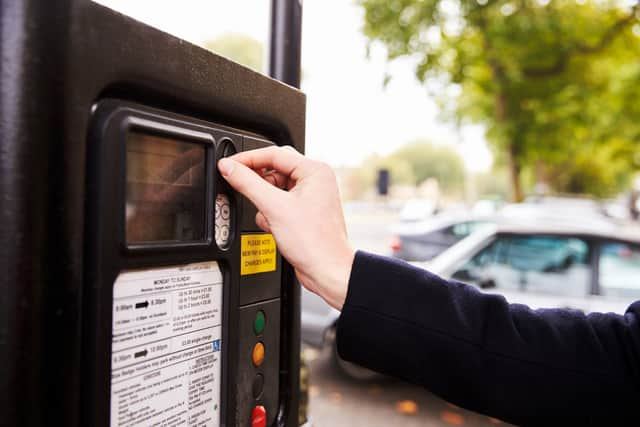Car parking: elderly drivers face exclusion as councils scrap payment meters
and live on Freeview channel 276
Millions of drivers could find it harder to park as councils scrap physical parking meters in favour of online payments, a motorists’ group has warned.
Some drivers, particularly the older and more vulnerable, could face increased social isolation and town centres could suffer a loss of footfall as authorities abandon traditional payment methods, according to the RAC. It urged council and private parking operators to consider the risks of “digital exclusion” before ditching multiple means of payment.
Advertisement
Hide AdAdvertisement
Hide AdA poll of drivers found that a fifth reported their council had either scrapped parking payment machines or was consulting on doing so. The same proportion said that such a move discriminated against them, rising to 30% among drivers aged over 65.
Drivers in London were most likely to say payment machines had already gone or were due to be going (44% of respondents), followed by those in the East of England (23%) and East Midlands (22%). Among the councils known to be scrapping all their payment machines are Brighton and Hove, Bromley, Enfield and Harrow.
Councils have begun removing physical parking meters due to changes in technology and the expense in bringing them up to modern standards. Most existing meters operate on the 3G mobile network which is due to be switched off by 2024. The cost of upgrading machines to 4G systems is seen as prohibitively expensive by many authorities, with one estimating that upgrades would cost £700 per machine while replacing machines too old to update would cost £5,000 per unit.
Smartphone apps such as Ringo and PaybyPhone are seen as a cheaper alternative for councils, also removing the expense of maintaining and repairing physical meters. However, for drivers without a smartphone or for those who struggle to use one, the shift is seen as an obstacle.
Advertisement
Hide AdAdvertisement
Hide AdWhen asked what impact a council removing payment parking machines would have on them, half (48%) said they would drive to a different car park where they can still pay using cash or a bank card. But a quarter (27%) said they would struggle to find somewhere else to park that was convenient, a figure that rose to 38% for drivers aged 65 and over.


Charity AgeUK has previously called for parking operators to ensure there is always an alternative method of payment amid fears older drivers may struggle with mobile payment technology. Its director, Caroline Abrahams, called the end of pay and display machines “disastrous” for anyone without a smartphone, including millions of older drivers, who would struggle to find another payment method.
She said: “If you are an older person who is reliant on your car for getting around but you have no means of legally parking it near to where you want to go, then you may be left feeling there is little point going there at all.”
RAC spokesman Rod Dennis said: “While for many people a switch to purely mobile phone-based parking payment poses no problems, our research clearly shows that for others it spells bad news. In fact, a majority of drivers across all age groups think getting rid of parking payment machines is a bad idea.
Advertisement
Hide AdAdvertisement
Hide Ad“Of course, cash-strapped councils will find it difficult to justify spending large sums of public money on upgrading parking machines which explains why some are bringing in third-party parking app providers instead – sometimes making parking charges even more expensive as they take their own cut.
“But it’s vital councils, and indeed private parking operators, carefully assess the impact of going down this route before taking machines away. Our research shows that by removing some methods of paying for parking they are undoubtedly making life harder for some drivers and possibly contributing to social isolation. The move could also lead to lower parking revenue as a result of drivers being put off from parking in the first place, something that’s surely not in any local authority’s interests.”
Dennis added that there were technological problems as well in areas with weak phone signals or instances where apps failed to function properly. He warned it could leave drivers at risk of unfair penalties because they can’t prove they tried to pay.
Comment Guidelines
National World encourages reader discussion on our stories. User feedback, insights and back-and-forth exchanges add a rich layer of context to reporting. Please review our Community Guidelines before commenting.
